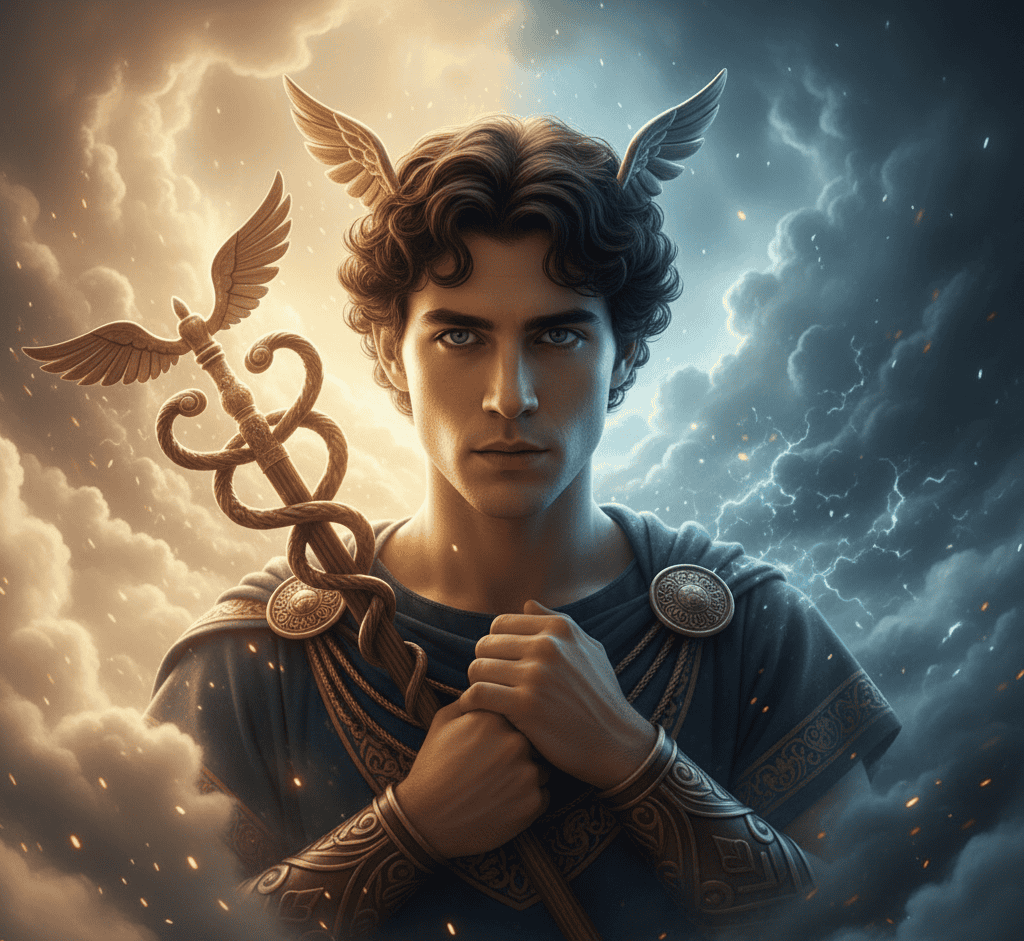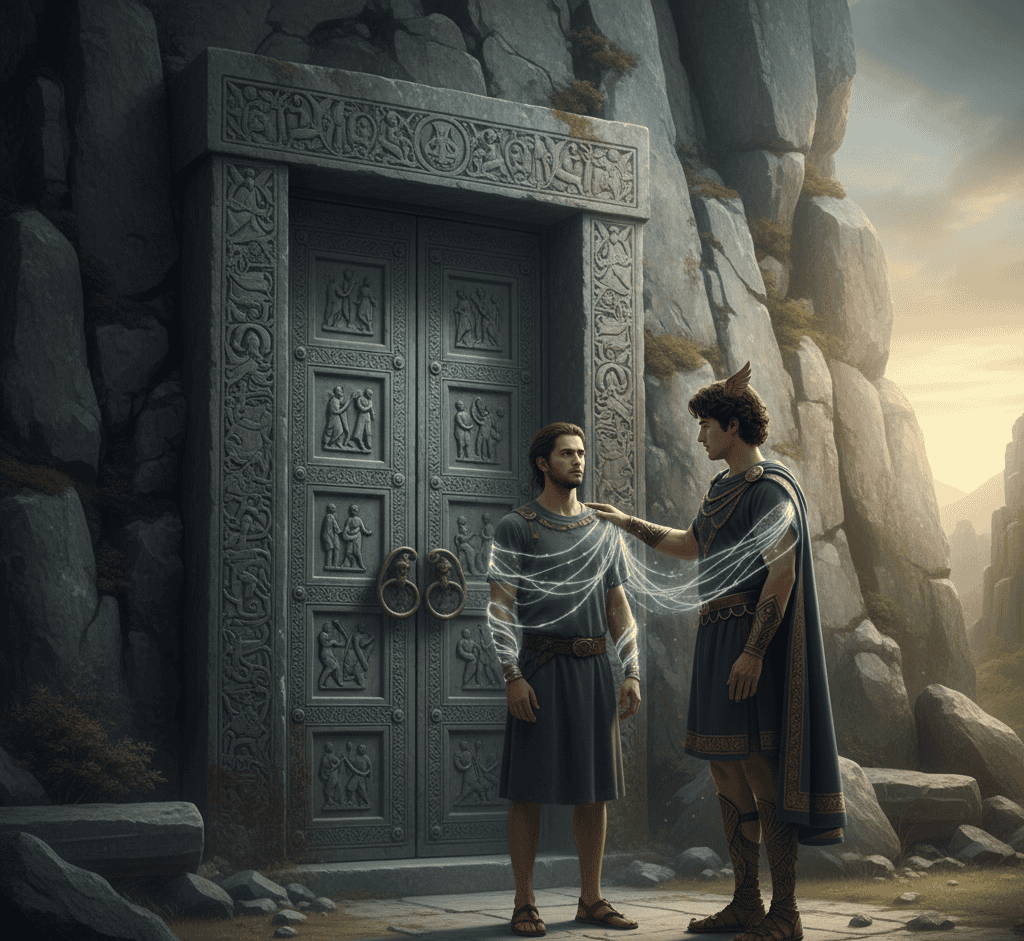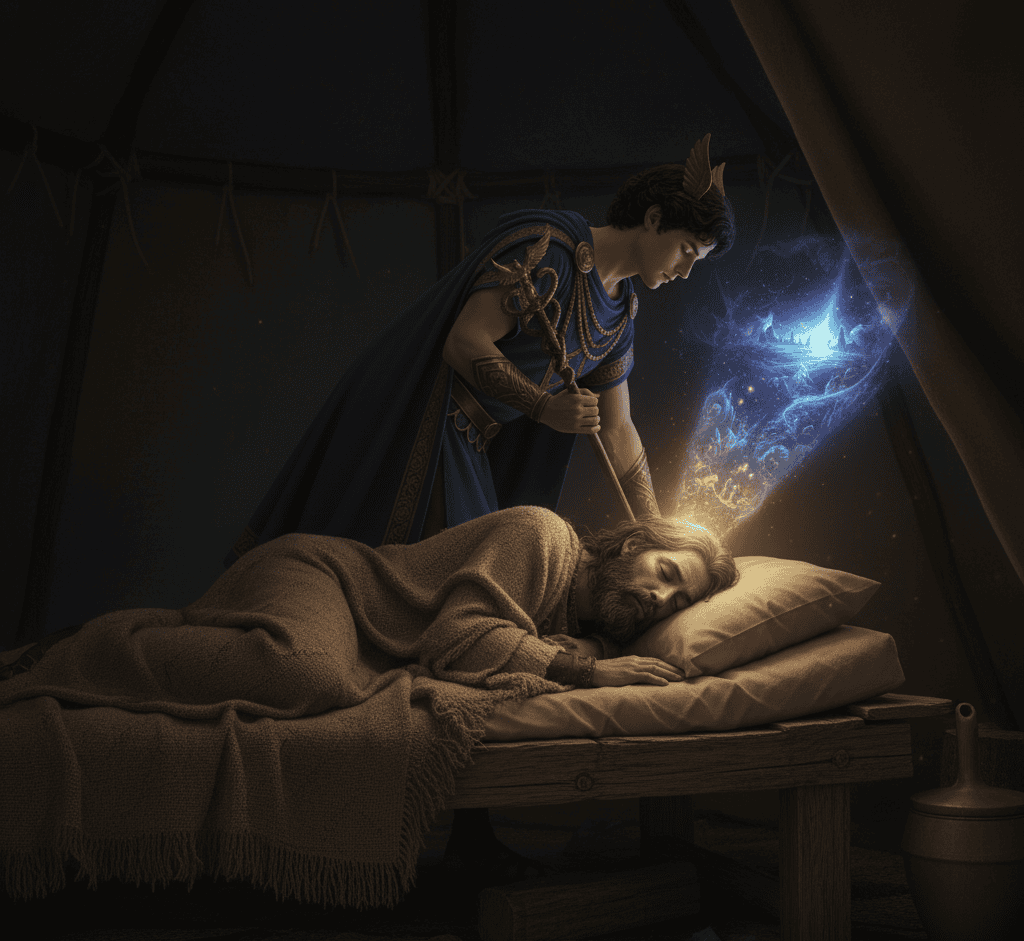In Greek mythology, Hermes is known as the swift messenger of the gods, the trickster, and the guide of travelers.
But beyond his more familiar roles, he holds a profound responsibility: escorting souls between the world of the living and the realm of the dead.
This role as psychopomp, a guide of souls, highlights Hermes’ unique position in the divine hierarchy.
He moves freely between realms, balancing mischief with duty and ensuring that the natural order of life and death is maintained.
The Messenger Becomes the Guide
Hermes’s earliest stories focus on his speed, cunning, and cleverness.
Born to Zeus and the nymph Maia, he demonstrated his intelligence immediately, stealing Apollo’s cattle as a newborn and inventing the lyre.
These tales of mischief may seem lighthearted, but they reveal a deeper truth: Hermes can move across boundaries with ease.
Just as he travels between gods and mortals, he also traverses the line between life and death.
In his role as psychopomp, Hermes guides souls to the Underworld without fear or delay.
Unlike Hades, who rules the dead, or Thanatos, who represents death itself, Hermes is neutral.
He does not judge the souls he escorts. He ensures that each spirit reaches its proper destination, maintaining balance and preventing chaos.
His presence comforts both the living and the dead, showing that the transition from one world to the next is not meant to be frightening when guided by one who understands the journey.
The Journey Through the Underworld
The passage to the Underworld is not simple. Rivers like Styx and Acheron separate the living from the dead, and their waters are treacherous.
Souls must be ferried across by Charon, the boatman, but Hermes often precedes them, preparing the way and calming the spirits.
He ensures that each soul knows its path and that the barriers between the worlds are respected.
Hermes’ role also extends to those returning temporarily to the living world, as in myths where heroes like Orpheus or Odysseus interact with the dead.
In these stories, Hermes acts as a mediator, making sure that encounters between life and death occur safely.
His knowledge of both realms makes him indispensable. Mortals who encounter him often sense a strange combination of mischief and authority.
The Lessons of Hermes’ Guidance
Hermes’s work as a guide carries lessons about acceptance and transition. Death, in mythology as in life, is not an end but a transformation.
By escorting souls, Hermes demonstrates that movement between stages of existence can be orderly and purposeful.
His presence reminds humans that fear of the unknown is natural, but guidance and understanding can ease the journey.
Additionally, Hermes embodies flexibility and adaptability. He teaches that boundaries are not rigid walls but thresholds to navigate.
This lesson extends beyond death: in life, we encounter thresholds in personal growth, relationships, and change.
Hermes’ guidance encourages courage, respect for the unknown, and awareness that some forces are inevitable but manageable when approached with knowledge and care.
Encounters with the Living
Though primarily associated with guiding souls, Hermes often interacts with the living to carry messages or influence events connected to the dead.
Prophets, seers, and heroes sometimes receive his assistance, showing that the living and dead are not wholly separate.
Hermes can inspire dreams, visions, or intuition, acting as a bridge for communication between worlds.
These encounters reinforce the idea that death is not isolation but connection. The living and the dead share a constant dialogue, whether through memory, ritual, or divine intervention.
Hermes’s presence in these moments ensures the transition is smooth, whether by delivering guidance, carrying warnings, or granting temporary passage to those brave enough to seek it.
He is a mediator of fate and an ambassador between realms.
The Enduring Symbol of the Psychopomp
Hermes’ role as a guide of souls has endured for thousands of years, influencing both mythology and modern spiritual thought.
The archetype of the psychopomp appears in many cultures: figures who escort the dead, mediate between worlds, and ease the journey of the soul.
Hermes’ speed, intelligence, and neutrality make him a fitting example.
Even today, the image of Hermes reminds us of the importance of guidance during transitions.
Life is full of thresholds, some physical, others emotional or spiritual. His myth teaches that these crossings, though daunting, can be navigated with grace, courage, and understanding.
By honoring the balance between the living and the dead, Hermes continues to serve as a timeless symbol of safe passage, reminding us that no journey is impossible when guided with wisdom.
In the end, Hermes is more than a messenger or trickster. He is a guardian of the threshold, a bridge between life and death, and a reminder that the unknown need not be feared.
His presence in mythology assures us that every soul has a guide, and every passage has a path, even through the darkest and most mysterious realms.

Ho sempre sentito una forte connessione con il Divino fin dalla mia nascita. Come autrice e mentore, la mia missione è aiutare gli altri a trovare l'amore, la felicità e la forza interiore nei momenti più bui.






